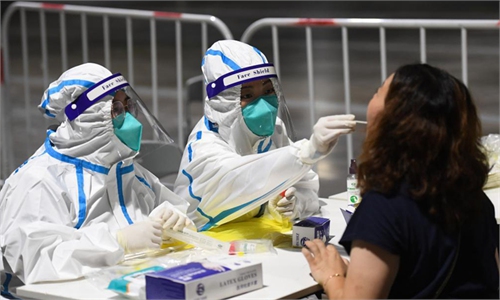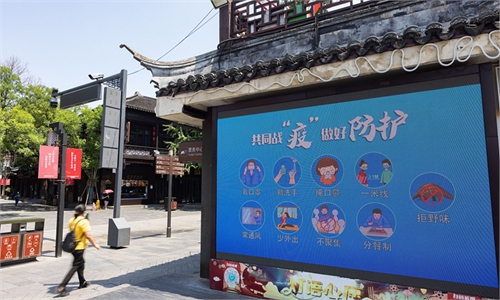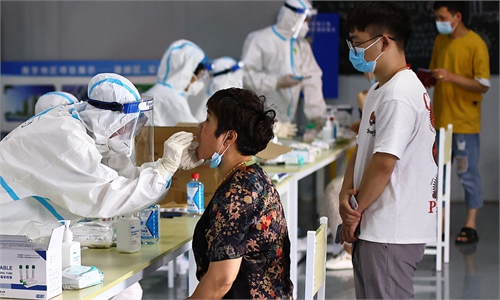Epidemic in Nanjing controllable but outbreak in Central China's Zhangjiajie elusive: top respiratory expert

A staff member sprays disinfectant at a COVID-19 testing site in Jiangning District of Nanjing, capital of east China's Jiangsu Province, July 24, 2021.Photo: Xinhua
China's top respiratory disease specialist, Zhong Nanshan, expressed grave concern over the latest COVID-19 outbreak in Central China's Zhangjiajie, a world-renowned tourist destination in Hunan Province where at least eight confirmed cases were found as of Sunday.Zhong said at an event on Saturday that he is less worried about the coronavirus control in Nanjing, because the big city is doing a good job in epidemic prevention and control but whether the epidemic in Zhangjiajie will further spread within the smaller city is still unknown.
Zhangjiajie has reported a total of eight confirmed cases as of press time and at least seven cities in five provinces, including Beijing, Sichuan, Liaoning and Jiangsu provinces found COVID-19 cases linked to the tourist destination.
The confirmation of a tourist agent in Zhangjiajie on Friday marked at least nine confirmed cases across the country had links with Meili Xiangxi Grand Theater in Zhangjiajie. One performance of the show reached 2,000 audiences.
Zhong pointed out that in an environment where about 2,000 people gathered for a show, not only all audiences will be tracked and tested, but their close contacts and family members too.
The grand theater has about three or four performances in both outdoors and indoors every day with each one lasting 90 minutes. It was closed for performance on Wednesday.
The theater gathered information of some 70,000 tourists who had been to the theater around July 22 and handed them to local anti-epidemic department, reports said.
This chain of epidemic spread centered on Zhangjiajie was firstly related to the epidemic at Nanjing Lukou Airport where it is confirmed to have been triggered by Delta mutated strain.
The epidemic in Nanjing is generally controllable as the city timely sealed off relevant communities and rolled out nucleic acid tests after the outbreak, Zhong said. Similar to the recent epidemic in South China's Guangzhou, which was also triggered by Delta, most patients had mild symptoms.
The arrival of Delta variant has upgraded the notion of close contacts. Close contacts of a confirmed patient should also include people staying in the same space, same building and people who have been in contact within four days, Zhong said.



